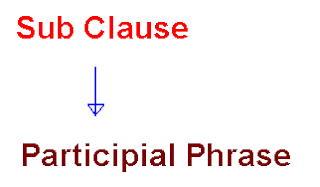A.GENERAL TERM
Participle is devided into two types:
Participle is devided into two types:
1.Present Participle
2.Past Participle
Present participle is commonly used in progressive tenses, e.g. present progressive tense, past progressive tense, present perfect progressive tense, future progressive tense, etc. Besides, present participle is also used in Noun phrase where the present participle is placed before the noun.
For examples:
Singing Bird, dancing doll, etc (Compare to, e.g. walking stick, waiting-room, etc, it's called gerund).
Past participle is commonly used in Perfect tenses.
For examples:
I have just told him the news.
She had explained the lesson yesterday.
I would have gone ...., etc
Besides, Past participle is also used in Passive Voice where there is a /be/ placed before the third verb/past participle.
For examples:
She was called last night.
They are being interviewed by the director.
I will be promoted by the supervisor.
In other chance, past participle is also used to make a noun phrase where the past participle is placed before a noun.
For examples:
Broken home
Broken heart
lost time
murdered people
Take notice when the phrase is used in a sentence (it can be placed or positioned either in subject or in object).
For examples:
she reviews murdered people in the TV.
lost time has changed the man's life.
B.MAIN DISCUSSION
Participial phrase is a participle which is used as a phrase and subtitute the use and the position of a sub clause.
Take notice below!
The girl who addressed me last night was dead.
The sentence above is in adjective clause pattern. From there, we can change it into participial phrase.
The girl addressing me last night was dead.
In this case, /the girl addressing me last night/ is a participial phrase. In other words, Sub clause has become a phrase.
The tenses which can be changed into participial pattern are so many.
Take notice of this changes below!
Adverbial Clause: After he has had the meeting, he was interviewed by the journalists.
Participial phrase : After having the meeting, he was interviewed by the journalists.
Take notice that the words like /he/ and /has=aux./ have been omitted and the focus of change is set to the verb /had=past participle/.
after (omitted : he has) having the meeting, he was interviewed by the journalists.
